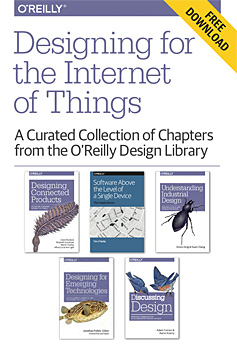"critical thinking" entries

In design, what we really need is critical thinking
More than reaction or direction, critique is the key to understanding the impact of design decisions.
Download a free copy of Designing for the Internet of Things, a curated collection of chapters from the O’Reilly Design library. This post is an excerpt from Discussing Design, by Adam Connor and Aaron Irizarry, one of the books included in the curated collection.
One of the most common ways design discussions are initiated is for a team member to ask for feedback on something they’ve created or an idea they have. They might just grab someone at a nearby desk because they want to take a break from putting something together and think about what they’ve done so far. Or it could be part of a planned milestone or date in the project’s timeline, often called Design Reviews.
It’s not that either of these is a bad time to get other’s thoughts. Rather, the first real problem we encounter is from the word “feedback” itself. It’s a word that’s become engrained in our vocabulary. We use it all the time, a la “I’d love to get your feedback on something…”
What is feedback?
The issue with the term “feedback” lies in its broadness. Feedback itself is nothing more than a reaction or response. Designers talk about feedback and feedback loops all the time in their work. The user of a system or product interacts with it in some way, perhaps by clicking a button, and the system changes in one way or another. It could be that an animated loading bar appears while some new data is fetched and displayed, or maybe some elements in the interface move their position.That reaction by the system is the feedback. It is the system’s response to what the user has done. Feedback is a reaction that occurs as a result of us doing something. In human-to-human interactions, such as the conversations we have in our projects, feedback can be nothing more than a gut reaction to whatever is being presented. And to be quite honest, even though we might not want to admit it, that’s often all it is.
Read more…

